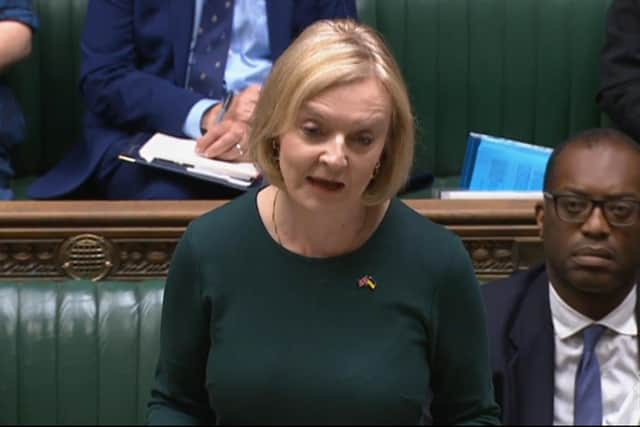Liz Truss unveils energy bailout to rival responses to the pandemic and financial crash
The policy, which could end up costing around £200bn according to some forecasts, is thought to be the scale and scope of the support given to households during the coronavirus pandemic, and the bailout of banks during the financial crisis.
In one of the Prime Minister’s first moves since taking office on Tuesday, it is expected to fundamentally alter how energy is produced and used for generations to come.
Advertisement
Hide AdAdvertisement
Hide AdAnnouncing the “Energy Price Guarantee”, Ms Truss told the House of Commons that the average household will pay no more than £2,500 a year for their energy bills for the next two years, starting from October.


This replaces the energy price cap, set by the energy regulator Ofgem, which was speculated to rise to £6,000 next year.
This will be paid for by contracts between the Government and energy companies. The firms will fix the price of energy and pass on the lower bills to consumers.
It is expected that this will be paid for by the current tax system in the UK, as well as through further borrowing.
Advertisement
Hide AdAdvertisement
Hide AdBusinesses are not covered by the energy price cap but will all be covered by a separate equivalent scheme lasting six months.
Further for support for pubs and the hospitality sector will be available afterwards, with Kwasi Kwarteng conducting a three-month review into which businesses will need further help.
The true cost of this bailout of consumers and companies has not been announced by the Government, and is expected to be revealed in the Chancellor’s fiscal statement, effectively a mini-budget, later this month.
There was no confirmation that the Office for Budget Responsibility will do a forecast of the policy’s effects.
Advertisement
Hide AdAdvertisement
Hide AdIt is expected that the move could help reduce the peak of inflation by 5 per cent, with forecasters expecting it to hit highs of 13-18 per cent next year.
Ms Truss and Jacob Rees-Mogg, her new Business Secretary, announced that the UK would now seek to be an “energy exporter” by 2040, effectively meaning the UK wants to be completely independent of other countries for its energy supply.
Mr Rees-Mogg said that this meant “we will extract every ounce of oil and gas from the North Sea”, as it was confirmed the Government expected to grant over 100 new licences for oil and gas drilling off the coast.
The Government also announced that the ban on fracking for shale gas will now be lifted, with the potential for extraction in the next six months.
Advertisement
Hide AdAdvertisement
Hide AdMs Truss also pledged further investment and growth in other sources of energy, such as nuclear, following the £700m pledged to the Sizewell C power plant announced by Boris Johnson.
She said the Government would “speed up our deployment” of hydrogen, solar, carbon capture and storage, and wind energy.
Two reviews will also be conducted into energy regulation and how the UK can meet net zero and be “pro-business and pro-growth”.
Ms Truss confirmed that no new windfall taxes of companies’ profits would be brought forward, despite the vast costs of the scheme.
Comment Guidelines
National World encourages reader discussion on our stories. User feedback, insights and back-and-forth exchanges add a rich layer of context to reporting. Please review our Community Guidelines before commenting.